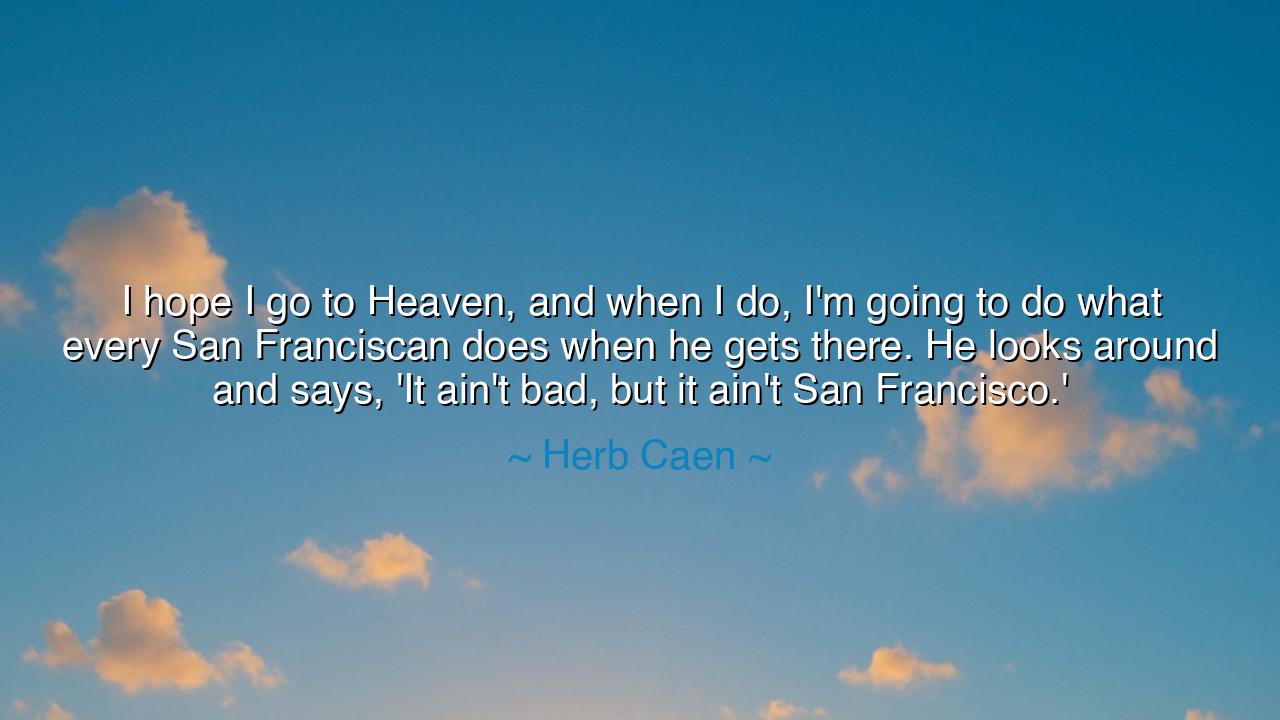
I hope I go to Heaven, and when I do, I'm going to do what every
I hope I go to Heaven, and when I do, I'm going to do what every San Franciscan does when he gets there. He looks around and says, 'It ain't bad, but it ain't San Francisco.'






The words of Herb Caen, “I hope I go to Heaven, and when I do, I'm going to do what every San Franciscan does when he gets there. He looks around and says, ‘It ain't bad, but it ain't San Francisco,’” are both playful and profound, a reflection of deep love disguised as humor. At first, they sound like a jest — a simple quip from the famed columnist who chronicled the soul of his city with warmth and wit. But beneath the laughter lies something timeless: the power of belonging, the holiness of place, and the sacred connection between a person’s heart and the home that shaped it. In truth, this quote is not just about a city, but about the spirit of human attachment — that mysterious bond between memory, identity, and the soil beneath our feet.
To understand this saying, one must know Herb Caen, who for decades was the beating voice of San Francisco. Through wars, revolutions, booms, and heartbreaks, he wrote of its fog and its laughter, its eccentrics and dreamers, its saints and sinners. To him, San Francisco was not a dot on a map — it was a living soul, vibrant and flawed, elegant and mischievous. His quote reveals the depth of devotion he felt for that place: even Heaven, in all its imagined perfection, could not surpass the city that had given him joy, meaning, and community. In this, Caen joins the lineage of the ancients, who believed that heaven is not only a destination beyond death, but a reflection of the places and loves we sanctify in life.
“It ain’t bad, but it ain’t San Francisco.” With this simple refrain, Caen elevates nostalgia into philosophy. He tells us that paradise, for each soul, is shaped by what it has loved most deeply. For one man it may be a city, for another a family, a field, or a song. The ancients would have said that Heaven is not found in some distant realm, but in the places where one’s spirit feels most alive. Caen’s Heaven, therefore, is not clouds and harps, but the rhythm of streetcars, the taste of salt in the air, the fog rolling through the Golden Gate, and the laughter of strangers who feel like kin. He teaches us that to love a place deeply is to taste eternity while still on earth.
History, too, gives us mirrors of this truth. Consider Homer’s Odysseus, who wandered for twenty years through war and wonder, only to find that the greatest paradise was his humble home in Ithaca. He had seen kingdoms of gold and palaces of marvel, yet none compared to the rocky shores where his heart belonged. In that same spirit, Caen reminds us that Heaven itself — however radiant — could not eclipse the sanctity of home. This is not arrogance, but reverence: the recognition that love sanctifies the ordinary, that the familiar becomes divine through devotion. Just as Odysseus yearned for Ithaca, Caen yearned for San Francisco — not for its wealth or fame, but for the soul of place that makes one feel whole.
Caen’s humor conceals a deeper wisdom about the nature of gratitude. To say “It ain’t bad, but it ain’t San Francisco” is to acknowledge that beauty exists everywhere, yet still to honor the particular light that shaped your own. The wise do not scorn Heaven; they simply recognize that Heaven already begins where love has taken root. For Caen, San Francisco was not perfect — it was human, alive, unpredictable. And that is why he loved it. In his eyes, Heaven lacked the quirks and contradictions that make life on earth rich with meaning. His devotion was not to perfection, but to the imperfection that gives life its soul.
Yet there is also a lesson of humility in his words. By placing San Francisco alongside Heaven, Caen reveals not arrogance, but gratitude — the awareness that paradise is not always elsewhere. It can be found in the laughter of friends, in the streets we walk each day, in the communities we build. The ancients taught that to live well is to recognize divinity within the ordinary. Caen’s jest is therefore a kind of prayer: that we might see our own “San Francisco” — the place, person, or purpose that gives our days meaning — as sacred in its own right.
So, my listener, take this wisdom to heart: find your San Francisco. Find that place or purpose so beloved that even Heaven could not tempt you to trade it. And when you find it, cherish it, nurture it, and let it shape your spirit. Do not wait for Heaven to recognize paradise — build it where you stand. For as Herb Caen teaches, Heaven is not a place we arrive at after death, but a state we create through love, belonging, and gratitude.
And when your days draw to their close, may you, too, look around and smile, saying not with pride, but with peace: It ain’t bad — but it ain’t the life I was blessed to live. For in that moment, you will know that you have already walked through your own Heaven on earth.






AAdministratorAdministrator
Welcome, honored guests. Please leave a comment, we will respond soon